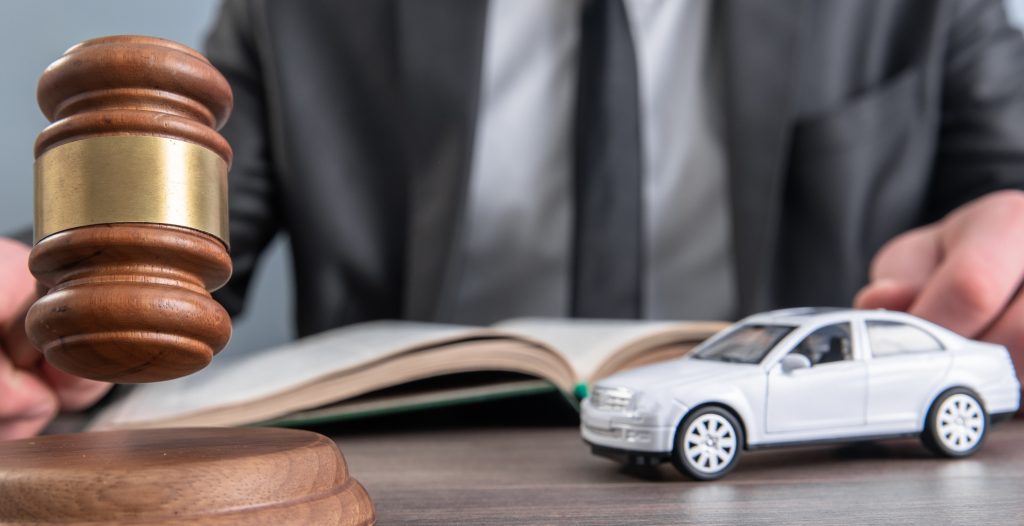What type of injury have you suffered?
Car Accident
- Car Accident
- Head Injury
- Premises Liability
- Products Liability
- Truck Accident
- Wrongful Death



HABLAMOS ESPAÑOL
(877) 880-4090Posted August 23, 2024 | Personal Injury Blog
As the auto industry advances towards driverless cars, Texas finds itself at the forefront. The Lone Star State has become a key testing ground for driverless cars. In 2017, the state passed Senate Bill 2205, laying the groundwork for testing and operating driverless cars on public roads.
However, this new technology presents new legal challenges. In this article, we will examine the current regulations and legal issues surrounding driverless cars in Texas. We will also consider how the state is adapting its laws to accommodate this technology.

Judge with toy car and gavel on table
Under Texas law, autonomous vehicles can operate on public roads without a human driver.
Senate Bill 2205 permits the operation of driverless vehicles in the state, provided that the vehicle:
The law also states that the “owner” of the driverless car is considered the operator of the vehicle. This is still the case even if he or she is not physically present in the car.
While this new law has positioned Texas as a leader in driverless car legislation, it has also raised several legal issues.
One of the most pressing legal challenges with driverless cars in Texas is determining liability after an accident. Traditional auto insurance models are based on human error. When a computer is in control, the lines of responsibility become blurred.
Texas law currently requires driverless car owners to carry the same minimum liability insurance as traditional car owners. However, determining coverage for vehicles with a lower risk of human error accidents is complicated. Insurance companies and lawmakers are grappling with adjusting premiums for such vehicles.
If an autonomous vehicle is involved in an accident, it may be unclear who should be held responsible.
For example, the responsibility for an accident could lie with one of the following parties:
Texas courts have not set clear laws in this regard, creating legal uncertainty.
Driverless cars generate and process vast amounts of data.
These cars process:
This data collection raises serious privacy concerns that Texas regulators must address. Currently, Texas does not have specific laws in place governing data collection and use by driverless cars. However, new regulations will likely be needed to protect consumer privacy and ensure secure data management.
Cybersecurity is another critical concern. As vehicles become more connected and reliant on software, they also become potential targets for hackers. Texas lawmakers are considering how to implement cybersecurity measures for driverless cars. It is important to protect both individual users and the broader transportation infrastructure.
While Texas has updated some of its traffic laws to accommodate driverless cars, many regulations are still for manually operated vehicles.
This creates challenges in areas such as:
The Texas Department of Transportation is working on updating road infrastructure to support driverless cars. This is a long-term process that will need a large financial investment. It will also require coordination with autonomous vehicle manufacturers.
One of the biggest issues facing regulators and manufacturers is ethics. How can driverless cars be programmed to make ethical decisions in unavoidable scenarios? While Texas law does not address this issue directly, it is a topic of ongoing debate.
Questions arise about how a driverless car should prioritize lives in a potential accident scenario.
Some of these questions are:
The rise of driverless cars could also affect employment in various industries. Texas, with its large trucking and transportation industry, may face workforce disruption. According to one source, autonomous vehicles (AVs) may cause significant job losses.
People who could be affected by this change include:
As AVs become more common, leaders need to focus on training workers and building trust. Policymakers are working to balance the economic benefits of this technology with the potential job losses it may cause. This effort could result in new regulations for driverless vehicles in businesses. It could also lead to the creation of programs designed to help workers transition to new jobs.
While Texas has established a statewide law for driverless cars, the ongoing debate continues. There is a pressing need to strike a balance between local, state, and federal regulations.
In Texas, local governments cannot regulate autonomous vehicles. Texas Transportation Code 545.452(b) states that neither political subdivisions nor state agencies may impose regulations or franchises on the operation of automated motor vehicles or driving systems.
Federal regulations should be put in place as driverless cars start traveling between states. Having federal regulations will ensure uniformity across state lines. Currently, the National Highway Traffic Safety Administration (NHTSA) lets individual states address concerns from their residents and manufacturers.
While this lack of federal regulation encourages innovation, it also creates uncertainty. This lack of surety can discourage investment in new autonomous technologies.
As autonomous vehicle technology continues to evolve, Texas will likely face new regulatory challenges.
Some areas that may need legislative attention include:
Texas has become a leader in adopting AV technology. However, there are critical legal and regulatory challenges ahead. Lawmakers and industry leaders need to work together to create rules that ensure public safety and address ethical concerns. They must focus on public safety and address ethical and societal issues.
As we enter this new era of transportation, the legal landscape for driverless cars in Texas will keep changing. The success of autonomous vehicles in Texas will largely depend on how well the state can adjust its laws and regulations to keep up with this fast-evolving technology.
If you have been involved in a driverless car accident or have questions about your rights in this emerging field of law, contact us. It’s better not to navigate these complex legal waters alone.
At Fielding Law, our experienced attorneys stay at the forefront of AV law and litigation. We’re here to protect your interests and ensure you receive fair treatment under the law.
Contact Fielding Law today for a consultation on how these new regulations might affect your case. Let us help you understand your rights and options in the rapidly changing landscape of AV law in Texas.

Text edited by Mitchell Fielding, a personal injury lawyer and partner at Fielding Law. Mitchell is known for his hard work ethic, friendly personality and dedication to the law. You can find out personal injury law offices in Taylorsville, UT and Mesquite, TX.